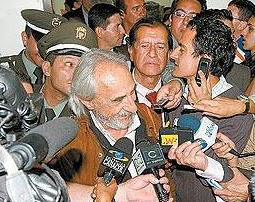In an encouraging development, three courts in Colombia, Costa Rica, and Chile have recently followed the growing regional consensus against criminal defamation by dismissing criminal penalties against journalists accused of libel and slander.
Members of the Araujo family felt their reputation had been damaged and filed charges against Molano. The court rejected the charges on February 9 and said there was no evidence that Molano had defamed the plaintiffs, the local press reported.
Also on February 9, a court in San José, Costa Rica, dismissed criminal defamation charges filed against journalist Nicolás Aguilar Ramírez, according to local news reports. In 2007, the San Jose-based daily La Nación broke two stories, written by Aguilar Ramírez, on the arrest of accused murderer Ng Tse Cheong Ming by Interpol in the United States. Ng Tse Cheong Ming, who had been accused in Costa Rica, filed defamation charges against the journalist and the newspaper, the local press said. The court’s decision said the news stories were based on facts, and were of public interest to the Costa Rican public, La Nación reported.
In Chile, freelance journalist Pascale Bonnefoy faced similar charges, after writing a story on a military official known as “The Prince” who was allegedly responsible for brutally beating political prisoners after the country’s 1973 coup. The piece was published in Swedish and Chilean media in 2006. Bonnefoy’s piece revealed the identity of the military official as Edwin Dimter Bianchi, a former lieutenant in the Chilean army.
Dimter denied the accusation and filed libel charges against Bonnefoy, the Santiago Times reported. On January 18, a Santiago tribunal dismissed the criminal charges against the journalist based on four witnesses’ testimonies. The witnesses consistently indicated that Dimter was “The Prince,” and described the abuses committed in the detention center, according to the ruling.
These recent legal decisions join a growing consensus among in Latin America that civil remedies provide adequate redress for press offenses. In December 2009, the Costa Rican Supreme Court eliminated prison terms for criminal defamation. One month earlier, in November 2009, the Argentine Congress repealed criminal defamation provisions in the penal code; while in April 2009, Brazil’s Supreme Federal Tribunal annulled the 1967 Press Law, a measure that had imposed harsh penalties for libel and slander.
